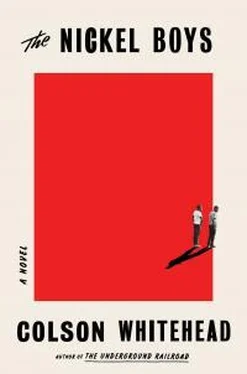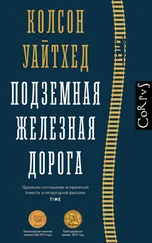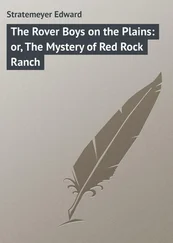Колсон Уайтхед - The Nickel Boys
Здесь есть возможность читать онлайн «Колсон Уайтхед - The Nickel Boys» весь текст электронной книги совершенно бесплатно (целиком полную версию без сокращений). В некоторых случаях можно слушать аудио, скачать через торрент в формате fb2 и присутствует краткое содержание. Год выпуска: 2019, Издательство: Penguin Random House LLC, Жанр: roman, на английском языке. Описание произведения, (предисловие) а так же отзывы посетителей доступны на портале библиотеки ЛибКат.
- Название:The Nickel Boys
- Автор:
- Издательство:Penguin Random House LLC
- Жанр:
- Год:2019
- ISBN:нет данных
- Рейтинг книги:4 / 5. Голосов: 1
-
Избранное:Добавить в избранное
- Отзывы:
-
Ваша оценка:
- 80
- 1
- 2
- 3
- 4
- 5
The Nickel Boys: краткое содержание, описание и аннотация
Предлагаем к чтению аннотацию, описание, краткое содержание или предисловие (зависит от того, что написал сам автор книги «The Nickel Boys»). Если вы не нашли необходимую информацию о книге — напишите в комментариях, мы постараемся отыскать её.
), that the world began to care.
The Nickel Boys — читать онлайн бесплатно полную книгу (весь текст) целиком
Ниже представлен текст книги, разбитый по страницам. Система сохранения места последней прочитанной страницы, позволяет с удобством читать онлайн бесплатно книгу «The Nickel Boys», без необходимости каждый раз заново искать на чём Вы остановились. Поставьте закладку, и сможете в любой момент перейти на страницу, на которой закончили чтение.
Интервал:
Закладка:
Kids swiped candy, it didn’t matter what color their skin was. Mr. Marconi himself, in his untethered youth, had engineered all sorts of foolishness. You lose a percentage here and there, but that was in the overhead—kids steal a candy bar today but they and their friends spend their money in the store for years. Them and their parents. Chase them out into the street over some little thing, word gets around, especially in a neighborhood like this where everybody’s in everybody’s business, and then the parents stop coming in because they’re embarrassed. Letting the kids steal was almost an investment, the way he looked at it.
Elwood drifted to a different perspective during his time in the store. Before he worked at Marconi’s, his friends gloated over their candy heists, cackling and blowing insolent pink bubbles of Bazooka once they got a good distance from the store. Elwood didn’t join in but he’d never had feelings on it. When Mr. Marconi hired him, his boss explained his attitude toward sticky fingers, along with where they kept the mop and what days to expect the big deliveries. Over the months, Elwood saw sweets disappear into boys’ pockets. Boys he knew. Maybe with a wink to Elwood if they caught his eye. For a year, Elwood said nothing. But the day Larry and Willie grabbed the lemon candies when Mr. Marconi bent behind the counter, he couldn’t restrain himself.
“Put it back.”
The boys stiffened. Larry and Willie had known Elwood their whole lives. Played marbles and tag with him when they were small, although that ended when Larry started a fire in the vacant lot on Dade Street and Willie got left back twice. Harriet struck them from the list of allowable companions. Their three families went back in Frenchtown for generations. Larry’s grandmother was in a church group with Harriet, and Willie’s father had been a childhood buddy of Elwood’s father, Percy. They shipped off to the army together. Willie’s father spent every day on his porch in his wheelchair, smoking a pipe, and he waved whenever Elwood passed.
“Put it back,” Elwood said.
Mr. Marconi tilted his head: That’s enough. The boys returned the candy and left the store, smoldering.
They knew Elwood’s route. Sometimes jeered at him for being a goody-two-shoes when he biked past Larry’s window on his way home. That night they jumped him. It was just getting dark and the smell of magnolias mingled with the tang of fried pork. They slammed him and his bike into the new asphalt the county had laid down that winter. The boys tore his sweater, threw his glasses into the street. As they beat him, Larry asked Elwood if he had any damned sense; Willie declared that he needed to be taught a lesson, and proceeded to do so. Elwood got a few licks in here and there, not much to talk about. He didn’t cry. When he came upon two little kids fighting on his block, Elwood was the kind to intervene and cool things down. Now he was getting his. An old man from across the street broke it up and asked Elwood if he wanted to clean himself or have a glass of water. Elwood declined.
The chain on his bike was popped and he walked it home. Harriet didn’t press him when she asked about his eye. He shook his head. By morning the livid bump underneath was a bubble of blood.
Larry had a point, Elwood had to admit: From time to time it appeared that he had no goddamned sense. He couldn’t explain it, even to himself, until At Zion Hill gave him a language. We must believe in our souls that we are somebody, that we are significant, that we are worthful, and we must walk the streets of life every day with this sense of dignity and this sense of somebody-ness. The record went around and around, like an argument that always returned to its unassailable premise, and Dr. King’s words filled the front room of the shotgun house. Elwood bent to a code—Dr. King gave that code shape, articulation, and meaning. There are big forces that want to keep the Negro down, like Jim Crow, and there are small forces that want to keep you down, like other people, and in the face of all those things, the big ones and the smaller ones, you have to stand up straight and maintain your sense of who you are. The encyclopedias are empty. There are people who trick you and deliver emptiness with a smile, while others rob you of your self-respect. You need to remember who you are.
This sense of dignity. The way the man said it, crackle and all: an inalienable strength. Even when consequences lay in wait on dark street corners on your way home. They beat him up and tore his clothes and didn’t understand why he wanted to protect a white man. How to tell them that their transgressions against Mr. Marconi were insults to Elwood himself, whether it was a sucker candy or a comic book? Not because any attack on his brother was an attack on himself, like they said in church, but because for him to do nothing was to undermine his own dignity. No matter that Mr. Marconi had told him he didn’t care, no matter that Elwood had never said a word to his friends when they stole in his presence. It didn’t make no sense until it made the only sense.
That was Elwood—as good as anyone. On the day he was arrested, just before the deputy appeared, an advertisement for Fun Town came on the radio. He hummed along. He remembered that Yolanda King was six years old when her father told her the truth about the amusement park and the white order that kept her outside the fence looking in. Always looking into that other world. Elwood was six when his parents took off and he thought, that’s another thing tying him to her, because that’s when he woke to the world.
CHAPTER THREE
On the first day of the school year, the students of Lincoln High School received their new secondhand textbooks from the white high school across the way. Knowing where the textbooks were headed, the white students left inscriptions for the next owners: Choke, Nigger! You Smell. Eat Shit. September was a tutorial in the latest epithets of Tallahassee’s white youth, which, like hemlines and haircuts, varied year to year. It was humiliating to open a biology book, turn to the page on the digestive system, and be confronted with Drop dead NIGGER , but as the school year went on, the students of Lincoln High School stopped noticing the curses and impolite suggestions. How to get through the day if every indignity capsized you in a ditch? One learned to focus one’s attention.
Mr. Hill started working at the high school when Elwood entered his junior year. He greeted Elwood and the rest of the history class and wrote his name on the blackboard. Then Mr. Hill handed out black markers and told his students that the first order of business was to strike out all the bad words in the textbooks. “That always burned me up,” he said, “seeing that stuff. You all are trying to get an education—no need to get caught up with what those fools say.” Like the rest of the class, Elwood went slow at first. They looked at the textbooks and then at the teacher. Then they dug in with their markers. Elwood got giddy. His heart sped: this escapade. Why hadn’t anyone told them to do this before?
“Make sure you don’t miss anything,” Mr. Hill said. “You know those white kids are wily.” While the students struck out the curses and cusses, he told them about himself. He was new to Tallahassee, having just finished his studies at a teaching college in Montgomery. He’d first visited Florida the previous summer, when he stepped off a bus from Washington, DC, in Tallahassee as a freedom rider. He had marched. Installed himself at forbidden lunch counters and waited for service. “I got a lot of course work done,” he said, “sitting there waiting for my cup of coffee.” Sheriffs threw him in jail for breach of peace. He was almost bored as he shared these stories, as if what he had done was the most natural thing in the world. Elwood wondered if he’d seen him in the pages of Life or the Defender, arm in arm with the great movement leaders, or in the background with the anonymous ones, standing tall and proud.
Читать дальшеИнтервал:
Закладка:
Похожие книги на «The Nickel Boys»
Представляем Вашему вниманию похожие книги на «The Nickel Boys» списком для выбора. Мы отобрали схожую по названию и смыслу литературу в надежде предоставить читателям больше вариантов отыскать новые, интересные, ещё непрочитанные произведения.
Обсуждение, отзывы о книге «The Nickel Boys» и просто собственные мнения читателей. Оставьте ваши комментарии, напишите, что Вы думаете о произведении, его смысле или главных героях. Укажите что конкретно понравилось, а что нет, и почему Вы так считаете.

![Колсон Уайтхед - Подземная железная дорога [litres]](/books/411182/kolson-uajthed-podzemnaya-zheleznaya-doroga-litres-thumb.webp)










